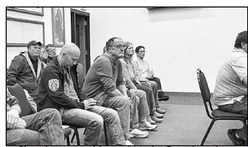Steam Show could have new rules to follow


By Kevin O’Brien
If a proposed ordinance is adopted to regulate gatherings of 3,000 or more people in rural Marathon County, the Edgar Steam Show would be the only existing event to fall under its regulations.
The fact that the 50-year-old event in the town of Wien would be subject to new rules and paperwork requirements brought pause to members of the Environmental Resources Committee (ERC) at its Jan. 30 meeting.
“You don’t want to overburden an event that doesn’t need it,” said committee chairman Jacob Langenhahn, noting that the Steam Show is already well-run.
Kevin Behnke, a member of the Steam Show’s board of directors, said he did not see any benefits for event hosts in the proposed ordinance. He said organizers of the Steam Show – which brings in about 12,000 people over three days in August – already do “probably 95 percent” of what would be required by the new ordinance, but if it is adopted, they would need to provide more documentation.
“It’s going to be a lot of paperwork, particularly when we’ve got to start listing our food vendors that show up,” he said, referring to one of the requirements in the ordinance.
Committee members held a lengthy discussion about the proposed changes to Section 12.04 of the ordinances, but they did not make any recommendations to the full board. One idea that gained consensus was the addition of a one-year sunset clause that would allow supervisors to revisit the new assemblies ordinance 12 months after it took effect.
Since the ERC meeting, the Infrastructure and Public Safety committees have both voted to recommend passage of the ordinance to the full county board, with a requirement that county staff and the ERC review the im-
See ASSEMBLIES/ page 2 Assemblies
Continued from page 1
pact of the ordinance a year after it’s implemented.
ERC member Tony Sherfinski said he’s skeptical anytime the government implements new regulations, especially if they don’t address a specific problem.
“Are we imposing a burden unnecessarily or are we doing something that ultimately benefits everybody in the county?” he asked.
County administrator Lance Leonhard said the process of rewriting the assemblies ordinance was prompted by a number of concerns, including the impact of large events on county services and the need to protect citizens’ First Amendment right to peaceably assemble, while ensuring the safety of event attendees and neighboring property owners.
Staff at Conservation, Planning and Zoning (CPZ) would be in charge of enforcing the ordinance, with the goal of encouraging event organizers – especially those just starting out – to plan ahead when addressing issues of public safety, sanitation and crowd control. The proposed ordinance would also allow the county to recoup its costs for providing “extraordinary services,” such as increased police presence and traffic control on highways.
The proposed ordinance would only apply to events in unincorporated townships that draw a cumulative total of 3,000 people or more over an eight-hour period.
CPZ director Laurie Miskimins said the current ordinance is considered unenforceable, so a work group of county officials has been meeting since last summer to review the existing language and suggest changes. She said the group has sought input from town officials and organizers of the Edgar Steam Show and Taste and Glow Balloon Fest in Stettin, which may be canceled this year due to lack of available parking. Under the proposed ordinance, event organizers must submit an application to CPZ no later than 40 business days before the event, giving county staff time to review the plans, ask questions and determine whether any additional public services are needed. If a permit is denied, the applicant can appeal to the county administrator, who has five days to issue a response in writing.
The township where the event would occur will be informed when an application is submitted and can also appeal the county’s decision to grant an assemblies permit.
The proposed ordinance requires applicants to provide proof that a number of items will be provided, including fencing, lighting, parking, drinking water, toilets and solid waste disposal. The applicant must also submit a plan for controlling sound amplification and offer assurances about on-site medical services and access for firefighting vehicles.
One provision mandates the presence of three state-licensed security guards for every 1,000 attendees. Behnke said this rule seemed “excessive,” considering that sheriff’s deputies have only been called out to the Steam Show once since it began in 1974. Leonhard clarified that the Steam Show could continue to use its own volunteers as security staff, as long as they passed background checks and paid a $27 fee to become state-certified. Behnke said the Steam Show uses volunteers to handle security during the day and hires a private security firm for overnight hours.
Patrol Cpt. Tim Burkholder of the sheriff’s department said the agency often gets requests for extra patrols in the area when a large event is planned, but if extra security is required, he said it would offer more peace of mind for event attendees and deputies.
“When we know there’s security, we kind of back off on that a little bit,” he said.
Sheriff Chad Billeb told supervisors that the ordinance is not meant to target the Steam Show – “they do things really well out there,” he said – but he’s hoping it will force first-time event organizers to plan ahead to avoid potential problems. He also noted that Farm Tech Days will be hosted at a Marathon County farm in 2026, so the ordinance should provide an expedited process for organizers of that event. Leonhard said the proposed ordinance will establish a “one-stop shop,” with event organizers only having to submit an application to the CPZ, which will then work with the health department and sheriff’s office to make sure all areas of concern are addressed simultaneously.
Behnke, however, said it’s imperative for event organizers to know as soon as possible if county officials come up with an any objections during their review period.
“We only have a 40-day window, so if somebody’s going to say no, we need an answer in a couple days, not a couple weeks,” he said.
One of the main concerns about any assemblies ordinance, according to corporation counsel, is that it does not unduly delay the approval of an event that meets reasonable standards. Puerner said the county cannot consider the “content” of an event when determining whether a permit should be issued, and it can only deny an application based on a justifiable government concern, such as protecting public safety.
“To me, it’s really important that we don’t have an ordinance on the books that raises constitutional concerns and potentially creates liability for the county if it’s enforced,” he said.
Miskimins said CPZ have already developed a list of Frequently Asked Questions (FAQs) and an application packet for event organizers who may need to familiarize themselves with the county’s ordinance.
“We also have to think about events that may come to our county and how we’re going to manage new events coming into the county,” she said.
Kevin Behnke
Chad Billeb





